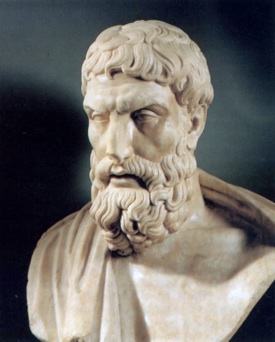
1. Matter is uncreatable.
2. Matter is indestructible.
3. The universe consists of solid bodies and void.
4. Solid bodies are either compounds or simple.
5. The multitude of atoms is infinite.
6. The void is infinite in extent.
7. The atoms are always in motion.
8. The speed of atomic motion is uniform.
9. Motion is linear in space, vibratory in compounds.
10. Atoms are capable of swerving slightly at any point in space or time.
11. Atoms are characterized by three qualities, weight, shape and size.
12. The number of the different shapes is not infinite, merely innumerable.
1. The atoms singly possess eternal properties which never change.
2. The atoms in combination possess qualities which are changeable, but which changes are limited and bounded by the eternal properties of the elements of which these combinations are composed.
3. That which is "created" or has a beginning as a result of a combination of elements has an end. This applies to worlds, which are born and die, as well as it applies to men, who are born and die.
4. The universe is in "flux," by which we mean constant motion, but the nature of this flux is not such that our senses are unable to perceive with sufficient accuracy to live happily.